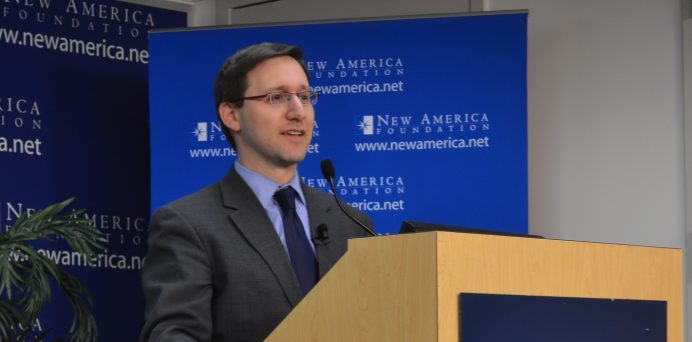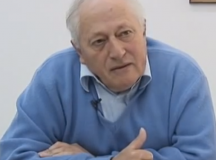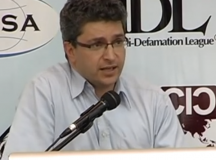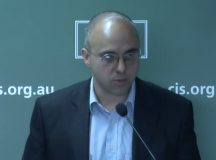Alan Johnson: There have been three military operations in Gaza since 2008. To avoid a fourth, Udi Dekel and Shlomo Brom of the Institute for National Security Studies (INSS) have proposed a new policy: ‘reconstruction for demilitarisation’. What is your assessment of the approach taken in the Dekel and Brom paper?
Matthew Levitt: First and foremost, it is good that someone is thinking strategically. Most people are so caught up in the day to day battles in this conflict, but we need to start thinking about the day after.
Israeli security experts sometimes talk about ‘mowing the lawn’, whereby occasionally they need to ‘go in’ and deal with the terrorist entities, undermine their capabilities, and do it again after some time. In the case of the Gaza Strip, that’s not a tenable plan anymore.
Therefore, the question is, how do you go about changing the situation on the ground in a positive way for all parties concerned? There is a real opportunity here; I’m glad that the authors grab onto it. For years now the Gaza Strip has been misgoverned – polls taken just before the conflict began indicate that as many as 80 per cent of Palestinians in Gaza wanted Hamas out. They see that their fellow Palestinians are living better lives in Israel and the West Bank and they feel left behind. That, plus the legitimate and obvious desire to demilitarise the Gaza Strip, leads to this type of a plan.
However, I think it was Yaakov Amidror, until recently National Security Advisor in Israel, who said that demilitarisation is going to be very hard to implement.
It is difficult to say who would go in and do the disarming – would an international peace force truly disarm Hamas? I just don’t see that happening. The UN has already talked about the conceivable idea of Kosovo or East Timor type of deployment, but only after a full ceasefire and a Hamas pledge to fire no more rockets.
The key issue here is not demilitarisation but preventing rearmament. It makes sense to focus on capabilities which really matter and not on the small arms. If militants in Gaza end up holding onto their AKs, that is not a huge problem. However, they cannot have strategic infrastructure and terror tunnels, rockets and rocket launchers. If Hamas was able to build around 30 or 40 tunnels, at a cost of between $1,000,000 and $3,000,000 per tunnel – under ‘siege’ – imagine what they could do if the siege was lifted and there were not adequate checks in place to be sure of what goes into the Gaza Strip.
And this has to be done in a way that Palestinians are comfortable with. The authors correctly note how this would be in Israel’s interest, but the Palestinians are going to have to be convinced to do it, too, and not just for the sake of improving their daily lives. The Palestinians will be fearful that an interim step – a ‘Marshall Plan’ in return for demilitarisation – would be a guise under which Israelis would simply try and replace Palestinian ambitions for political self-rule with economic opportunity.
Finally, Hamas cannot remain in government. While the authors are correct in saying that Israel will have to withdraw its opposition to any reconciliation deal, it is important to understand what Hamas’s gambit is. They agreed to the establishment of a national unity government and gave into the Palestinian Authority (PA) demands, including on security cooperation with Israel, not only because of their political disenfranchisement from Iran and Egypt, or the fact that people in the region are much more focused on Syria and Iraq than on them, or because of their financial troubles, but because they felt it was a good deal.
You see, according to that deal, Hamas would not have ministers in the cabinet, but also wouldn’t be responsible for governing Gaza. They wanted to go back to the model where as an opposition party they got bonus points for any social welfare or charity provision they gave, but weren’t held accountable for anything they didn’t give (because they would not be the governing entity). Someone else would be responsible for paying salaries, but it would still be the salaries of their people. While they wouldn’t have ministers in the government, all of the middle managers and civilian employees they hired after 2007 to replace the Fatah people would be kept in office. Now that obviously can’t be allowed to happen because Hamas would then be in de facto control of the ministries – if not the minister himself – and so would essentially be controlling the Gaza Strip.
Yes, the PA can’t come back to the Gaza Strip on the back of an Israeli tank. On the other hand, there has got to be a way – and I imagine there are many diplomatic, creative solutions in the context of a ceasefire – for the PA to come back into Gaza, especially now that there is a national unity government. The idea which Dekel and Brom propose provides a framework for the only wise way out of this dilemma.
In return for making sure that the Gaza Strip is no longer a military zone controlled by a non-state actor – a designated terrorist group that is pledged to the destruction of Israel – the international community, including Israel, needs to find ways to fix Gaza. There are several things this would need to involve. First, finding ways to open the crossings; Israel can’t be at those crossings, that would not be agreeable to the Palestinians – whether it’s the PA or Hamas – but someone has to be there. Second, there needs to be some type of international force patrolling parts of Gaza so that Israel doesn’t have to claim a need for a security strip. Finally, something should be done in regards to the sea coast; the Palestinians are going to want greater fishing rights and the Israelis are legitimately going to be very concerned about more smuggling and terrorist operations via the sea.
AJ: Should the goal be demilitarisation?
ML: However much demilitarisation there is, the key is making sure that there is complete, serious and verifiable efforts to prevent remilitarisation. UN Security Council Resolution 1701 – regarding Hezbollah’s arsenal in Lebanon after the 2006 war – was a complete failure because there was no-one to patrol those borders. Iran could fly weapons into Syria, which could be driven openly across the border into Lebanon – and there was nothing anybody could do about it. However, that’s not the case with Hamas. A ‘1701 solution’ would be very effective because the weapons won’t be able to be smuggled through Israel. The Egyptians should be given assistance to do even more to prevent smuggling (and they’re already doing a lot). This is a contained area where the borders are controlled; as long as the people situated at those border crossings are from agencies trusted by both sides, then there is every reason to believe that – if we were able to convince the parties to reach such an agreement – it could be very effective.
AJ: Let me ask you about regional actors. The Dekel and Brom paper talks about a US-led project with regional actors heavily involved. What is your assessment of which regional actors would be supportive, which would try and be disruptive and what is the balance of forces between the two?
ML: It would be very difficult for entities that want to spoil this type of agreement. It is going to have tremendous ‘buy-in’ from the vast majority of people on the ground. Everybody wants this conflict to end – except for people who are committed to militancy with no end. Qasem Soleimani and the Iranian leadership are going to be very upset. Hezbollah is going to yell platitudes, but not much more than that, because it’s extremely distracted by its investment in Syria, not to mention the fact that Hezbollah has been quite significantly deterred by Israel since the July 2006 war.
Hamas may not like it, but they’re not going to have any other choice. Countries like Qatar – which are very sympathetic to the Muslim Brotherhood and to Hamas – are going to have a very hard time (because of their relations with Europe and the US) if they don’t get behind something which ends a bloody conflict and rebuilds the Gaza Strip.
I think the Europeans would be very excited by this, as well as the Saudis and the Gulf states. This is something that Egypt would benefit from politically, diplomatically and possibly economically, because of what will be asked of them.
This could be presented as a regional solution. One that benefits Israel, benefits the Palestinians no less than Israel, and all the countries in the region; because nobody has the stomach for this conflict right now. Yes, people are paying attention to this conflict – and it’s a terrible conflict – but there are other, more pressing issues in the world, especially what is happening in Syria right now. Whilst most Arab states are angry at what’s happening in Gaza right now, they are also pretty annoyed that Hamas instigated this.
It’s going to be very difficult to be against a ceasefire that ends this conflict and commits to serious reconstruction in Gaza, if the only caveat is that Gaza can no longer be a military base targeting Israel, and Hamas can no longer hide and build bunkers in and under hospitals, mosques and homes.











































